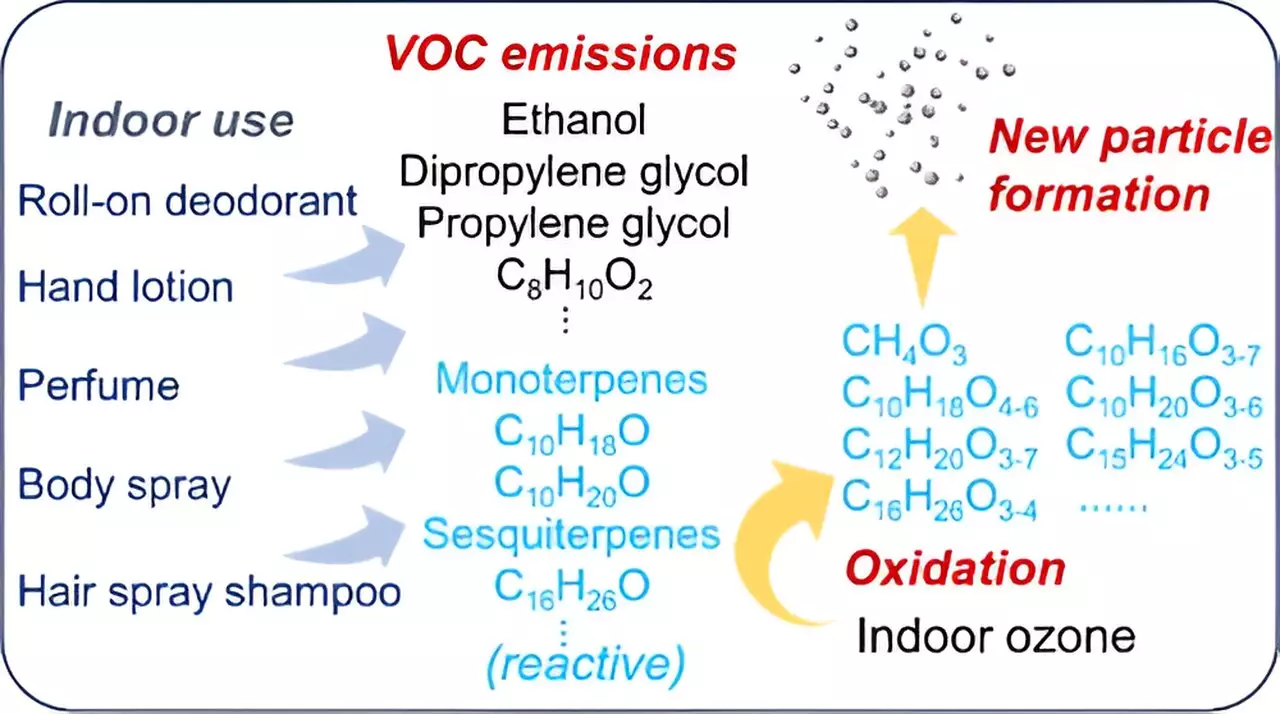Recent studies have illuminated a concerning aspect of our everyday lives: the personal care products that we use daily are contributing significantly to indoor air pollution. Research conducted at the École Polytechnique Fédérale de Lausanne (EPFL) reveals that common items such as deodorants, perfumes, and hair sprays release over 200 volatile organic compounds (VOCs) into the air. These compounds can interact with ozone, resulting in the formation of new, potentially harmful particles that may infiltrate our lungs. The health implications of consistent exposure to these particles remain largely unknown, signaling a need for greater awareness and further research into respiratory health risks associated with these products.
This investigation began with a straightforward yet revealing approach: the research team led by Assistant Professor Dusan Licina selected a range of widely used products from top brands found in stores throughout Europe. Licina’s team, known for their focus on human-oriented built environments, utilized advanced experimental facilities designed to simulate real indoor conditions, thereby ensuring a detailed analysis of air quality changes resulting from the use of these products.
Research Methodology: Simulating Real-Life Conditions
The research involved precise experimentation designed to emulate typical indoor product usage. The scientists conducted two primary experiments. In the first setup, personal care products were applied under controlled conditions without the introduction of ozone. Subsequently, in a second phase, ozone—an outdoor gas that can infiltrate indoor spaces—was added into the mix. This reactive gas can enter homes through open windows during the summer months or result from indoor activities like 3D printing.
To gather comprehensive data, the research team deployed five sophisticated instruments capable of quantifying and characterizing the gases and particles produced. Over two years, the data was meticulously processed, revealing that while the application of personal care products in the absence of ozone resulted in the release of more than 200 VOCs, the introduction of ozone led to the formation of new VOCs and ultrafine particles. Alarmingly, the concentrations of these particles surpassed those typically found in heavily polluted urban environments.
The findings from this study have raised significant alarm bells regarding respiratory health. Licina’s observations highlight an urgent gap in our understanding of the toxicological effects of these VOCs and aerosols, especially given their proximity to our respiratory zones during application. The potential for these particles to nucleate and form larger aggregates further compounds the concerns, as such particles can efficiently lodge themselves into our lungs, possibly leading to adverse health effects with prolonged exposure.
Despite the researchers’ calls for more detailed toxicological studies, the immediate implications of this research suggest a dire need to reassess our daily habits around personal care. The ongoing reliance on aerosol deodorants, hair sprays, and heavily scented lotions may not only compromise indoor air quality but also have implications for long-term respiratory health.
To mitigate the issues related to indoor air pollution caused by personal care products, several strategies can be adopted. Firstly, enhancing ventilation in indoor spaces—especially during the application of such products—can significantly reduce the concentration of harmful compounds in the air. Introducing air-cleaning technologies such as activated carbon-based filters can also be instrumental.
Moreover, limiting indoor ozone levels through conscientious practices is crucial in creating healthier indoor environments. Another pertinent recommendation from researchers, although difficult for many to accept, is the need to reassess our reliance on synthetic personal care products. Transitioning to more natural alternatives with low chemical reactivity may provide a valuable pathway toward safeguarding our indoor air quality without sacrificing personal care practices.
While the allure of personal care products remains strong, it is of paramount importance for consumers to be conscious of their potential impacts on air quality. As we develop greater awareness of this issue, fostering a shift towards safer alternatives could lead to enhanced health outcomes for everyone.


Leave a Reply